

Can Dogs Have Mental Disabilities? Signs and Definitions Explained
by Lena Park
Last updated: September 22, 2025
Verified and Approved by:
Angela Morris,
MSW, LCSW
Fact Checked

Overview
Dogs can indeed experience mental disabilities, which may present as various behavioral and psychological conditions, including anxiety disorders and cognitive dysfunction syndrome. This issue has become increasingly prevalent, especially in the wake of the COVID-19 pandemic. It’s crucial to recognize these challenges early on, as doing so can significantly enhance the well-being of our beloved canine companions. By understanding the emotional struggles that both dogs and their owners face, we can foster a supportive environment that encourages timely intervention and care.
Introduction
The emotional landscape of dogs is often overlooked, yet recent studies reveal a startling increase in mental health issues among these beloved companions. As pet owners grapple with the implications of anxiety, compulsive behaviors, and cognitive dysfunction, understanding the signs and definitions of dog mental disabilities becomes crucial.
What happens when the furry friend that brings joy also faces psychological challenges? This article delves into the complexities of canine mental health, exploring how to identify symptoms and the importance of early intervention. It also challenges common misconceptions that may hinder effective care, inviting you to reflect on your own experiences and the love you share with your dog.
Defining Dog Mental Disabilities
The question of whether dogs can have mental disabilities is important, as these cognitive disabilities encompass a variety of behavioral and psychological conditions that can significantly affect a dog’s ability to thrive in their environment. These disabilities can show up in different forms, such as:
- Anxiety disorders
- Compulsive behaviors
- Cognitive dysfunction syndrome (CDS)
Recent studies, including one by Green Element, reveal a troubling rise in anxiety-related behaviors among our canine companions, with separation anxiety increasing over 700% since 2020 and fear of strangers emerging as the predominant cause of anxiety, escalating by 295%. Unlike physical disabilities, which are often more apparent, psychological disabilities can be subtle, necessitating careful observation and understanding from both pet owners and professionals. As Dr. Paul Bloom wisely notes, “Understanding that dogs can have mental disabilities is essential for ensuring their welfare and delivering suitable care.”
Moreover, case studies highlighting the heightened levels of pet anxiety since the COVID-19 pandemic underscore the real-life implications of these psychological disabilities on dogs and their guardians. Recognizing these issues is crucial for the emotional well-being of our pets, empowering owners to provide the necessary support and care they deserve.
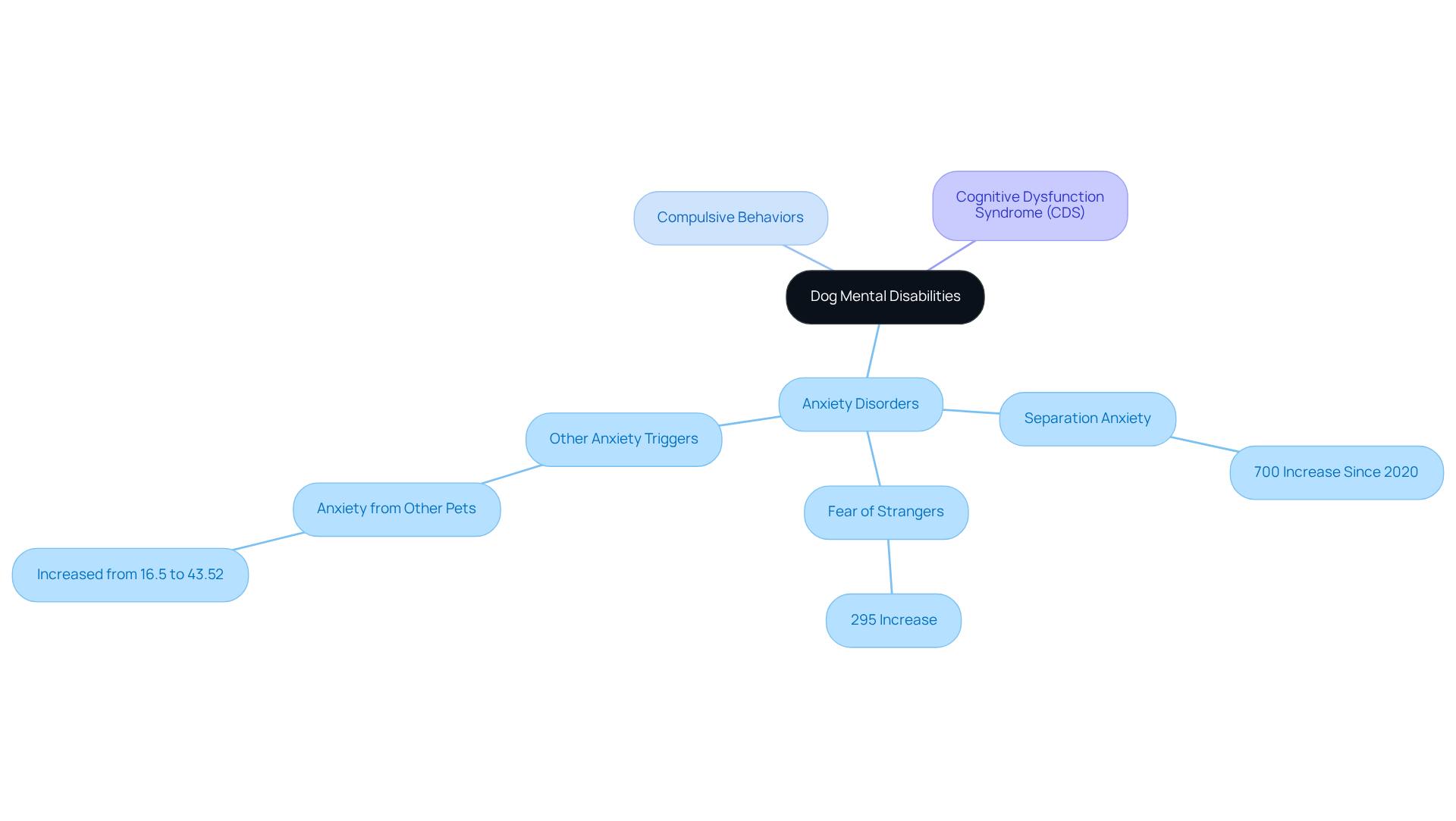
Identifying Signs and Symptoms of Mental Disorders in Dogs
Identifying if can dogs have mental disabilities can be a challenging journey, requiring us to observe their behavioral and emotional changes with care. Common indicators of distress may include:
- Excessive barking
- Destructive tendencies
- Social withdrawal
- Altered appetite
- Anxiety symptoms such as:
- Pacing
- Trembling
- Tail tucking
- Fidgeting
- Avoiding eye contact
- Excessive licking
For instance, if a dog suddenly shows signs of aggression or fearfulness, it may be grappling with underlying anxiety or stress, leaving us concerned for their well-being.
As our furry friends age, they may develop cognitive dysfunction syndrome, leading to the consideration of whether can dogs have mental disabilities, which can manifest as:
- Disorientation
- Disrupted sleep patterns
- Altered interactions with their environment
It’s heartbreaking to think that many canines experience anxiety, with certain breeds being more vulnerable to these feelings. Recognizing these signs early is crucial; timely veterinary intervention can significantly enhance a dog’s quality of life, offering them the comfort they deserve.
Veterinary professionals emphasize the importance of a multidisciplinary approach to effectively address these behavioral issues. This approach considers both medical conditions and environmental factors that may be contributing to your dog’s distress. A veterinarian can help rule out or diagnose any illnesses that might be causing anxious behaviors, providing peace of mind for you as a pet owner.
By learning to understand your dog’s cues and body language, you can offer them the comfort and support they need, ultimately fostering a healthier emotional state. Remember, you are not alone in this journey; there is support available to help you and your furry companion navigate these challenges together.
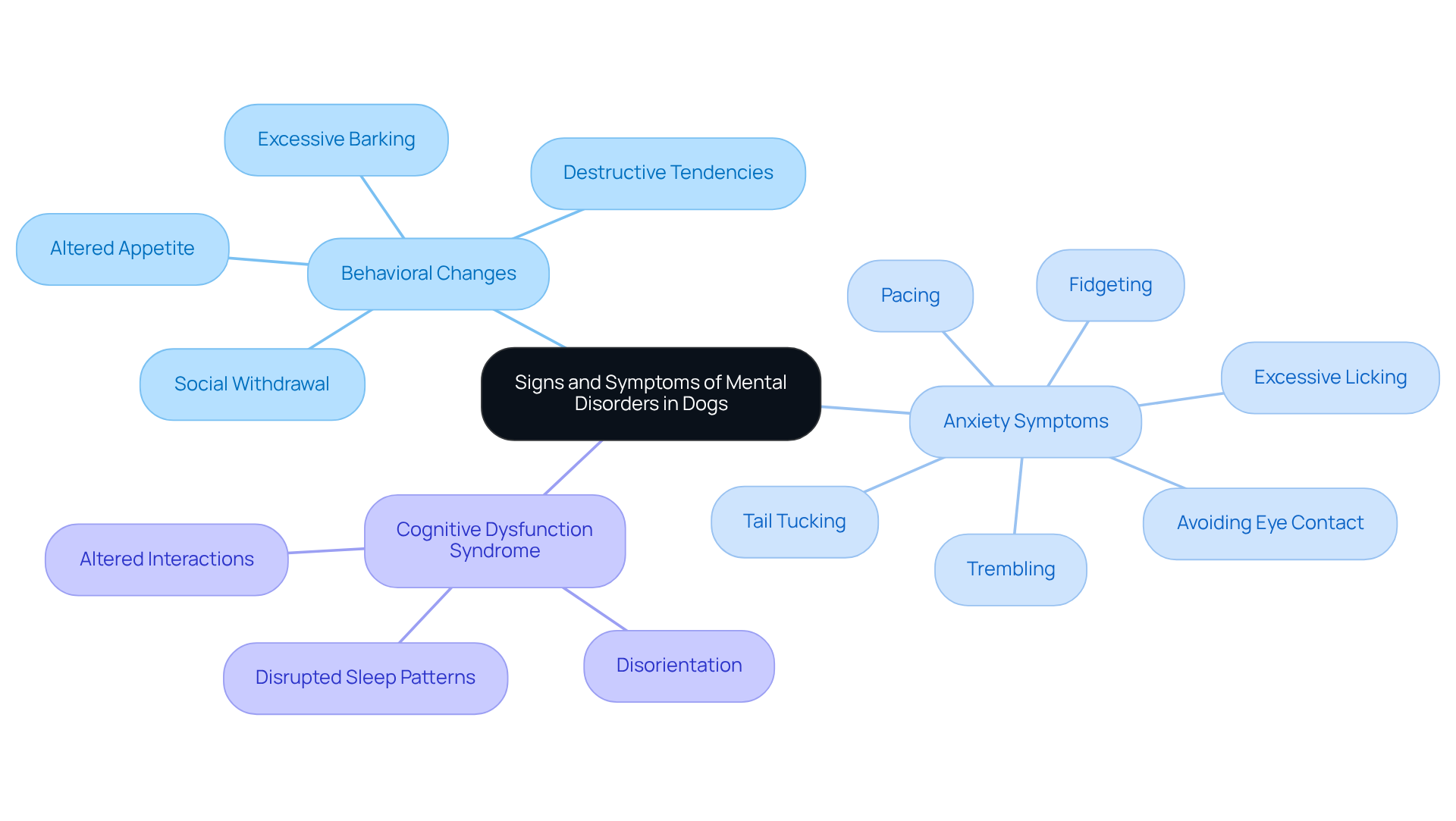
The Importance of Early Intervention
Prompt action is essential when addressing psychological concerns, especially considering that can dogs have mental disabilities. Just as with humans, the sooner we identify and treat a mental health issue, the better the outcome for our furry friends, which makes us wonder, can dogs have mental disabilities? When considering whether can dogs have mental disabilities, it’s important to note that dogs showing signs of anxiety can greatly benefit from behavioral therapy, environmental modifications, and, when necessary, medication. Veterinary behaviorist Dr. Karen Overall emphasizes that a well-structured treatment plan, including medication, can effectively manage anxiety disorders in dogs, raising the question of whether can dogs have mental disabilities, which often stem from underlying behavioral issues.
Engaging with veterinarians and pet therapists allows you, as a caring owner, to create tailored treatment strategies that meet your dog’s unique needs. This proactive approach not only alleviates your dog’s distress but also strengthens the bond between you and your pet, fostering a healthier and more harmonious living environment. Have you noticed how your pet reacts in different situations? Research shows that behavioral therapy has a high success rate, with many dogs demonstrating significant improvement in their anxiety symptoms after consistent treatment.
For instance, therapy sessions that incorporate positive reinforcement techniques have proven effective in helping anxious dogs adapt to their surroundings and reduce stress levels. Furthermore, studies indicate that 75% of pet owners reported that a friend’s or family member’s well-being improved due to pet ownership, highlighting the broader impact pets can have on emotional health. By prioritizing early intervention, you can ensure your furry companion leads a happier, more balanced life, especially in understanding if can dogs have mental disabilities. Remember, you are not alone in this journey; there is support available to help both you and your dog thrive.
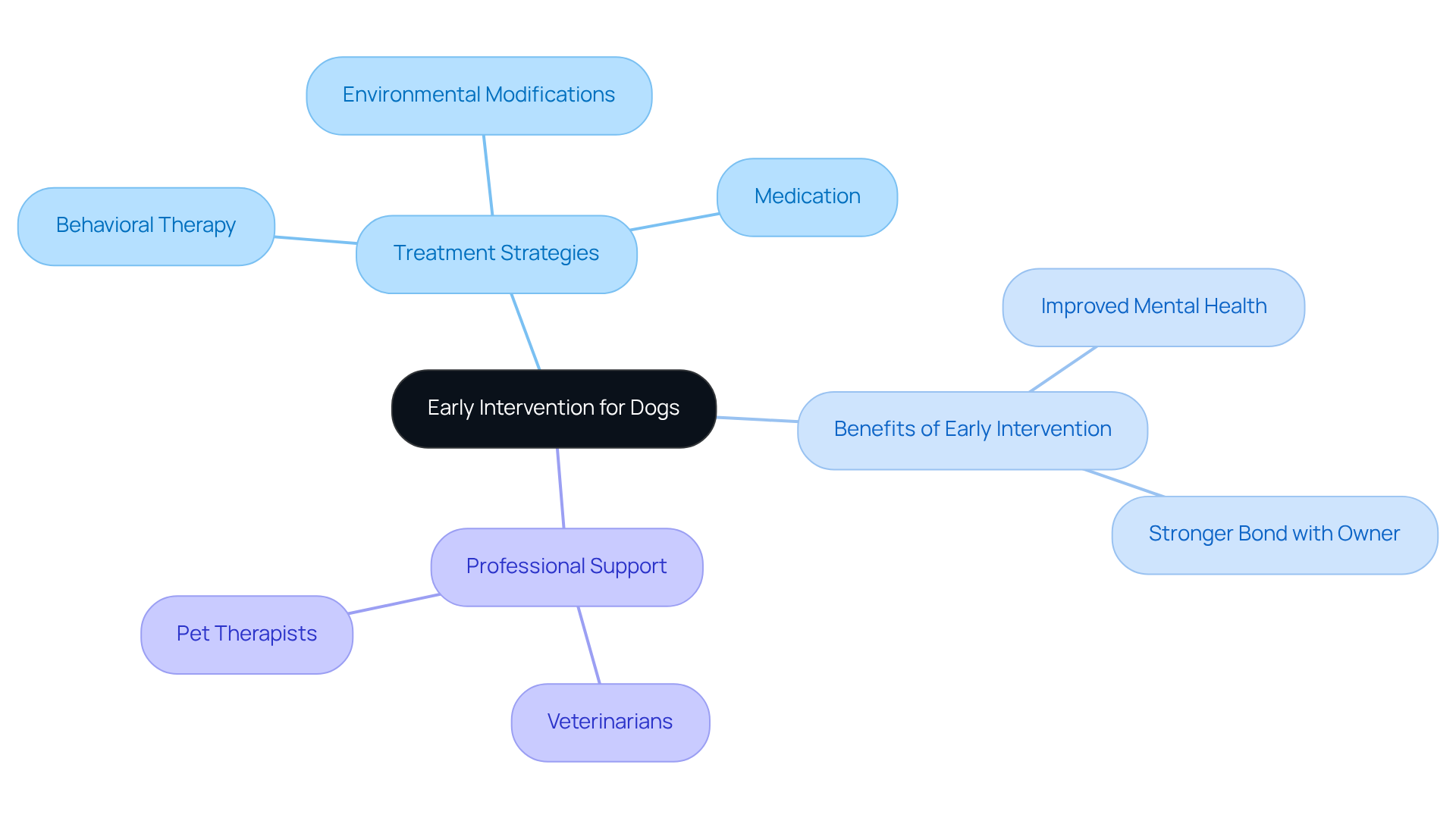
Common Misconceptions About Dog Mental Disabilities
Misunderstandings about cognitive impairments in canines can significantly obstruct our understanding and treatment of these beloved companions. Many people mistakenly believe that canines cannot experience psychological issues akin to those faced by humans, raising the question of whether can dogs have mental disabilities. Yet, research shows that canines can indeed suffer from conditions like anxiety and depression, leading to the discussion on whether can dogs have mental disabilities that express themselves through various behaviors.
It’s also a common misconception that behavioral problems are solely due to insufficient training or discipline. While training is undoubtedly important, many behavioral issues can lead us to wonder if dogs can have mental disabilities, necessitating a different approach.
For example, a study revealed that 86% of pet owners feel their pets positively impact their well-being, underscoring the deep emotional bonds that can exist between canines and their humans.
Educating pet owners about these misunderstandings is crucial for fostering a compassionate and informed perspective on canine well-being, ultimately leading to enhanced care and support for animals in need.
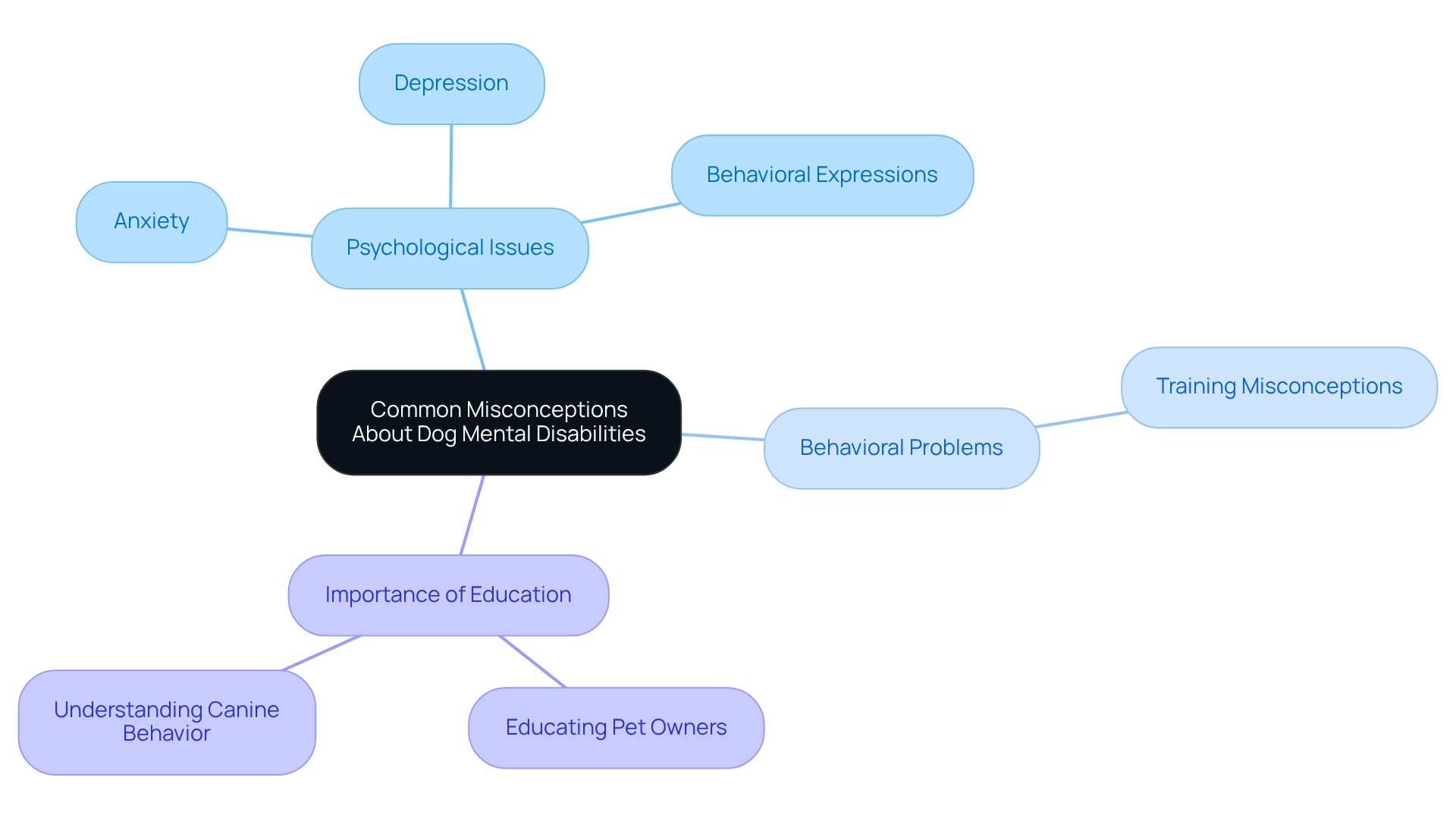
The Role of Emotional Support Animals in Mental Health
Emotional support animals (ESAs), particularly dogs, play a vital role in supporting individuals who face psychological challenges such as anxiety, depression, and PTSD. These beloved companions provide not only comfort but also a sense of companionship that can significantly ease the symptoms associated with these conditions. Research reveals that having a supportive dog nearby can foster a calming atmosphere, reducing stress and enhancing emotional stability. For instance, studies indicate that emotional support animals can lower cortisol levels, the primary stress hormone, during times of psychological strain.
The bond between individuals and their ESAs is often a crucial component of their wellness treatment strategies. Dogs, serving as ESAs, offer unconditional love while also promoting routine and social interaction, both essential for emotional regulation. Mental wellness experts emphasize the importance of this relationship, noting that ESAs can help soothe frayed nerves and instill a sense of security. A survey found that 74% of pet owners felt their well-being improved after welcoming a pet into their lives, highlighting the profound benefits of animal companionship.
Furthermore, the therapeutic advantages of ESAs extend beyond emotional support. They assist individuals in developing behavioral consistency and improving daily functioning, which is especially beneficial for those grappling with psychological challenges. As Dr. Jo Nash points out, emotional support animals enhance psychological well-being by encouraging emotional regulation and reducing stress. This underscores the necessity of recognizing and addressing the mental health needs of both individuals and their canine companions, ensuring that dogs can fulfill their essential roles as emotional support animals.
At Wellness Wag, we deeply understand the significance of this bond and offer a seamless process for obtaining legitimate ESA letters through personalized consultations with licensed medical professionals. Our clients have shared their uplifting experiences, expressing how straightforward and hassle-free the approval process was. One satisfied pet parent shared, “Thanks to Wellness Wag, I received approval for my ESA quickly and without any difficulties.” This reflects our commitment to providing affordable and legitimate ESA letters, ensuring individuals can access the benefits and legal protections they deserve. It is also important to understand that ESAs have limited or no legal rights outside of the home, which distinguishes them from service animals that are protected under the ADA.
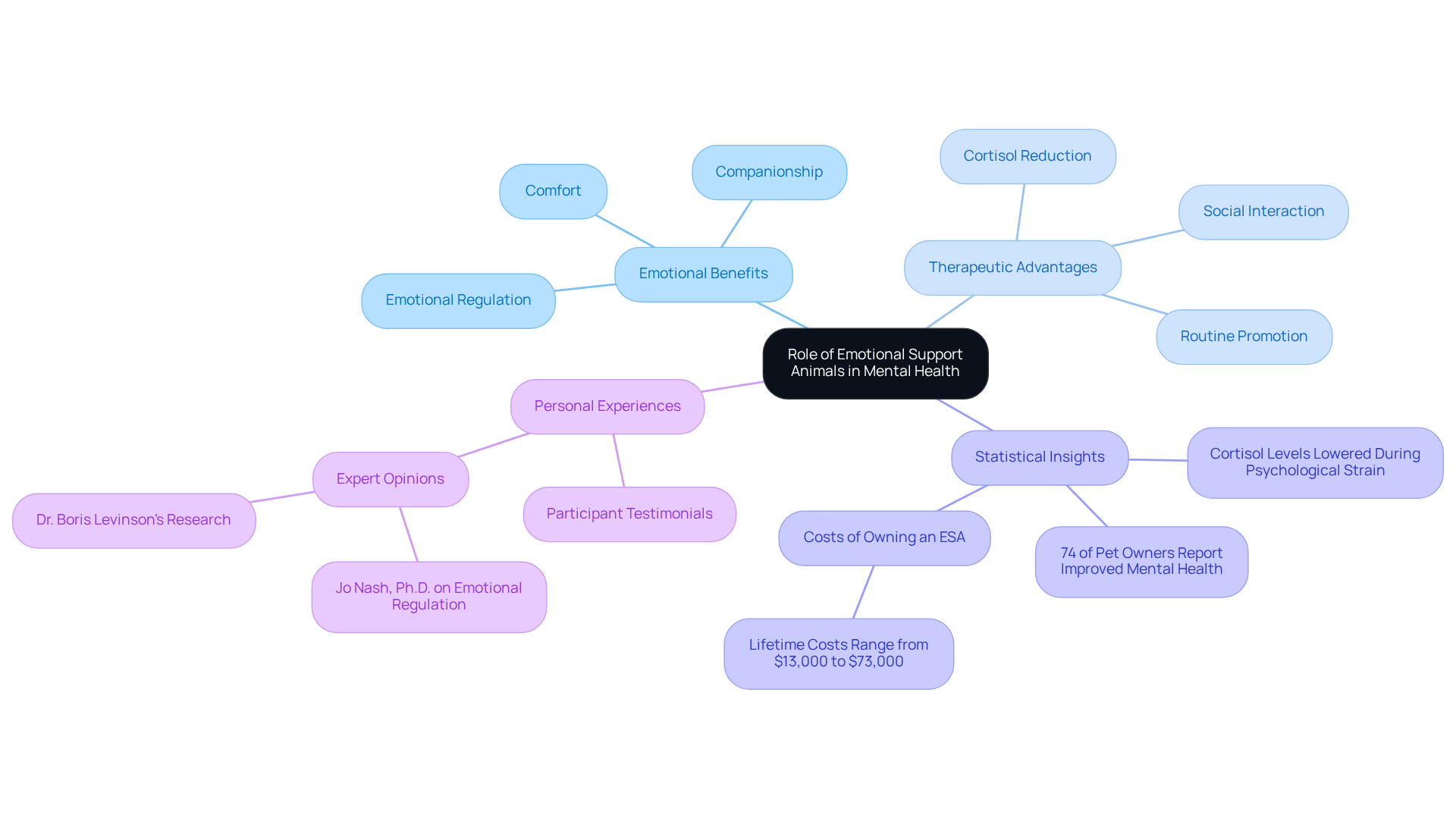
Conclusion
Recognizing that dogs can face mental disabilities is essential for their overall well-being and care. These cognitive challenges, which may appear as anxiety, compulsive behaviors, or cognitive dysfunction syndrome, call for careful observation and informed intervention from both pet owners and professionals.
The article underscores the increasing prevalence of anxiety-related behaviors in dogs, particularly following the COVID-19 pandemic. It highlights the importance of identifying signs of distress, such as excessive barking or social withdrawal, and the need for early intervention through behavioral therapy and veterinary care. Additionally, dispelling common misconceptions about canine mental health can cultivate a more compassionate and informed approach to caring for our beloved pets.
Ultimately, the well-being of dogs is closely linked to their mental health, emphasizing the necessity for proactive measures to ensure they enjoy fulfilling lives. By educating ourselves about the signs and symptoms of mental disabilities in dogs, we can take meaningful steps to support our furry companions. This commitment not only enriches the lives of dogs but also strengthens the bond between pets and their owners, fostering a more harmonious and understanding environment for everyone involved.
Frequently Asked Questions
Can dogs have mental disabilities?
Yes, dogs can have mental disabilities, which encompass a variety of behavioral and psychological conditions that affect their ability to thrive. These disabilities can manifest as anxiety disorders, compulsive behaviors, and cognitive dysfunction syndrome (CDS).
What recent trends have been observed regarding anxiety in dogs?
Recent studies indicate a significant rise in anxiety-related behaviors among dogs, with separation anxiety increasing over 700% since 2020 and fear of strangers rising by 295%.
What are some common signs and symptoms of mental disorders in dogs?
Common indicators of mental disorders in dogs include excessive barking, destructive tendencies, social withdrawal, altered appetite, and anxiety symptoms such as pacing, trembling, tail tucking, fidgeting, avoiding eye contact, and excessive licking.
How can cognitive dysfunction syndrome (CDS) affect older dogs?
Cognitive dysfunction syndrome can lead to disorientation, disrupted sleep patterns, and altered interactions with their environment in older dogs, indicating potential mental disabilities.
Why is it important to recognize signs of mental disabilities in dogs?
Recognizing signs of mental disabilities is crucial for a dog’s emotional well-being. Early identification allows for timely veterinary intervention, which can significantly enhance a dog’s quality of life.
What approach do veterinary professionals recommend for addressing behavioral issues in dogs?
Veterinary professionals recommend a multidisciplinary approach that considers both medical conditions and environmental factors contributing to a dog’s distress. This approach helps in diagnosing any underlying illnesses that may cause anxious behaviors.
How can pet owners support their dogs with mental disabilities?
Pet owners can support their dogs by learning to understand their cues and body language, providing comfort and support, and seeking veterinary assistance when necessary to ensure their pets receive the care they need.
Certify Your Emotional Support Animal Today

Why You Can Rely on Us?
At Wellness Wag, we believe your pet deserves care rooted in both science and compassion. Each article is carefully researched, written in clear language for pet owners, and then reviewed by qualified professionals to ensure the information is evidence-based, current, and practical for real-life care. Our goal is to help you feel confident in making informed decisions about your pet’s health and well-being.
Reviewed by
Angela Morris, MSW, LCSW
Angela is a licensed clinical social worker with 20 years of experience in patient advocacy and community mental health. She has assisted numerous clients with ESA evaluations and brings a deep understanding of disability accommodations, ensuring that all information is accurate, supportive, and practical.

Written by :
Lena Park
Last Updated :
September 22, 2025












